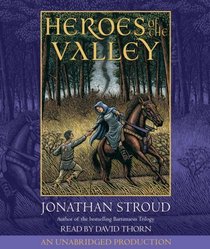Helpful Score: 1
I very much enjoyed this book. In style, it reminded me quite a lot of books by Howard Pyle and retellings of Viking legends that I read as a child. However, this book is much more morally and ethically ambiguous. It provides the reader with a lot of food for thought without handing out predigested pap on a platter. For a more contemporary comparison, it also brought to mind Ursula LeGuin's 'Gifts.'
Long ages ago, the titular valley was settled by a group of legendary heroes. Each founded a House, and over time each house has become an insular community within the larger insular community of the Valley, which no one leaves - ever - for fear of the Trows, whom, legend has it, will attack and curse anyone who crosses the border. The houses squabble amongst themselves and think ill of each other, but are ruled in a civilized manner by a council. However, young Halli Sveinsson harks back to the age of heroes, when brave deeds were done and men still carried swords. All around him can see that his violent streak is bound to get him into trouble. Of course, it does.
As a protagonist, Halli is a surprisingly not-very-nice person. He's not quite bad - or is he? (His sidekick, Aud, a girl from a neighboring House, is purely delightful as a character, however.) Stroud very much enjoys taking a reader's expectations for this sort of book and turning them on their heads. The 'messages' that one might presume will be delivered, aren't.
However, in order to appreciate this, the reader needs to have developed those expectations to start with, which is part of why I find this very peculiar that this book is marketed for "10-and-up." I'm not saying that 10-yr-olds shouldn't read this, but I'm sure that at ten, I would have missed a lot of it. It's a lot more subtle and complex than many books I've read that were aimed at 'adults.'
Long ages ago, the titular valley was settled by a group of legendary heroes. Each founded a House, and over time each house has become an insular community within the larger insular community of the Valley, which no one leaves - ever - for fear of the Trows, whom, legend has it, will attack and curse anyone who crosses the border. The houses squabble amongst themselves and think ill of each other, but are ruled in a civilized manner by a council. However, young Halli Sveinsson harks back to the age of heroes, when brave deeds were done and men still carried swords. All around him can see that his violent streak is bound to get him into trouble. Of course, it does.
As a protagonist, Halli is a surprisingly not-very-nice person. He's not quite bad - or is he? (His sidekick, Aud, a girl from a neighboring House, is purely delightful as a character, however.) Stroud very much enjoys taking a reader's expectations for this sort of book and turning them on their heads. The 'messages' that one might presume will be delivered, aren't.
However, in order to appreciate this, the reader needs to have developed those expectations to start with, which is part of why I find this very peculiar that this book is marketed for "10-and-up." I'm not saying that 10-yr-olds shouldn't read this, but I'm sure that at ten, I would have missed a lot of it. It's a lot more subtle and complex than many books I've read that were aimed at 'adults.'





